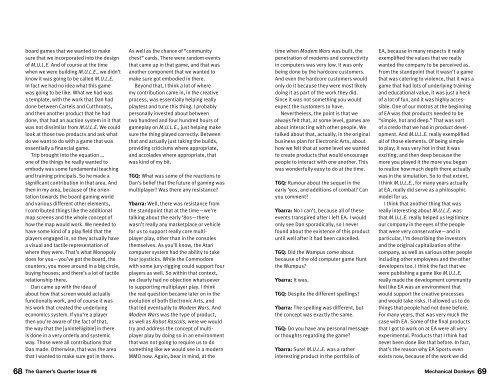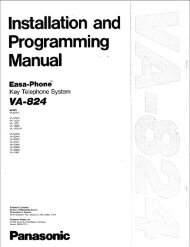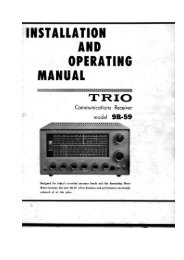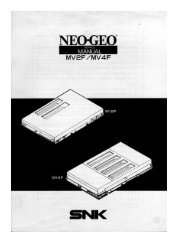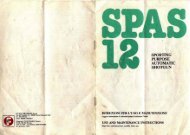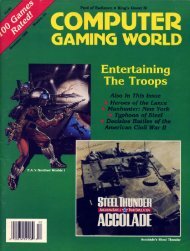The Gamer's Quarter - Issue #6 - TextFiles.com
The Gamer's Quarter - Issue #6 - TextFiles.com
The Gamer's Quarter - Issue #6 - TextFiles.com
Create successful ePaper yourself
Turn your PDF publications into a flip-book with our unique Google optimized e-Paper software.
oard games that we wanted to make<br />
sure that we incorporated into the design<br />
of M.U.L.E. And of course at the time<br />
when we were building M.U.L.E., we didn’t<br />
know it was going to be called M.U.L.E.<br />
In fact we had no idea what this game<br />
was going to be like. What we had was<br />
a template, with the work that Dan had<br />
done between Cartels and Cutthroats,<br />
and then another product that he had<br />
done, that had an auction system in it that<br />
was not dissimilar from M.U.L.E. We could<br />
look at those two products and ask what<br />
do we want to do with a game that was<br />
essentially a financial game.<br />
Trip brought into the equation …<br />
one of the things he really wanted to<br />
embody was some fundamental teaching<br />
and training principals. So he made a<br />
significant contribution in that area. And<br />
then in my area, because of the orientation<br />
towards the board gaming world<br />
and various different other elements,<br />
I contributed things like the additional<br />
map screens and the whole concept of<br />
how the map would work. We needed to<br />
have some kind of a play field that the<br />
players engaged in, so they actually have<br />
a visual and tactile representation of<br />
where they were. That’s what Monopoly<br />
does for you—you’ve got the board, the<br />
counters; you move around in a big circle,<br />
buying houses; and there’s a lot of tactile<br />
relationship there.<br />
Dan came up with the idea of<br />
about how that screen would actually<br />
functionally work, and of course it was<br />
his work that created the underlying<br />
economics system. If you’re a player<br />
then you’re aware of the fact of that,<br />
the way that the [unintelligible] in there<br />
is done in a very orderly and systemic<br />
way. Those were all contributions that<br />
Dan made. Otherwise, that was the area<br />
that I wanted to make sure got in there.<br />
As well as the chance of “<strong>com</strong>munity<br />
chest” cards. <strong>The</strong>re were random events<br />
that came up in that game, and that was<br />
another <strong>com</strong>ponent that we wanted to<br />
make sure got embodied in there.<br />
Beyond that, I think a lot of where<br />
my contribution came in, in the creative<br />
process, was essentially helping really<br />
playtest and tune this thing. I probably<br />
personally invested about between<br />
two hundred and four hundred hours of<br />
gameplay on M.U.L.E., just helping make<br />
sure the thing played correctly. Between<br />
that and actually just taking the builds,<br />
providing criticisms where appropriate,<br />
and accolades where appropriate, that<br />
was kind of my bit.<br />
TGQ: What was some of the reactions to<br />
Dan’s belief that the future of gaming was<br />
multiplayer? Was there any resistance?<br />
Ybarra: Well, there was resistance from<br />
the standpoint that at the time—we’re<br />
talking about the early ’80s—there<br />
wasn’t really any marketplace or vehicle<br />
for us to support really core multiplayer<br />
play, other than in the consoles<br />
themselves. As you’ll know, the Atari<br />
<strong>com</strong>puter system had the ability to take<br />
four joysticks. While the Commodore<br />
with some jury-rigging could support four<br />
players as well. So within that context,<br />
we clearly had no objection whatsoever<br />
to supporting multiplayer play. I think<br />
the real question became later on in the<br />
evolution of both Electronic Arts, and<br />
that led eventually to Modem Wars. And<br />
Modem Wars was the type of product,<br />
as well as Robot Rascals, were we would<br />
try and address the concept of multiplayer<br />
play by doing so in an environment<br />
that was not going to require us to do<br />
something like we would see in a modern<br />
MMO now. Again, bear in mind, at the<br />
time when Modem Wars was built, the<br />
penetration of modems and connectivity<br />
in <strong>com</strong>puters was very low. It was only<br />
being done by the hardcore customers.<br />
And even the hardcore customers would<br />
only do it because they were most likely<br />
doing it as part of the work they did.<br />
Since it was not something you would<br />
expect the customers to have.<br />
Nevertheless, the point is that we<br />
always felt that, at some level, games are<br />
about interacting with other people. We<br />
talked about that, actually, in the original<br />
business plan for Electronic Arts, about<br />
how we felt that at some level we wanted<br />
to create products that would encourage<br />
people to interact with one another. This<br />
was wonderfully easy to do at the time.<br />
TGQ: Rumour about the sequel in the<br />
early ’90s, and additions of <strong>com</strong>bat? Can<br />
you <strong>com</strong>ment?<br />
Ybarra: No I can’t, because all of these<br />
events transpired after I left EA. I would<br />
only see Dan sporadically, so I never<br />
found about the existence of this product<br />
until well after it had been cancelled.<br />
TGQ: Did the Wampus <strong>com</strong>e about<br />
because of the old <strong>com</strong>puter game Hunt<br />
the Wumpus?<br />
Ybarra: It was.<br />
TGQ: Despite the different spellings?<br />
Ybarra: <strong>The</strong> spelling was different, but<br />
the concept was exactly the same.<br />
TGQ: Do you have any personal message<br />
or thoughts regarding the game?<br />
Ybarra: Sure! M.U.L.E. was a rather<br />
interesting product in the portfolio of<br />
EA, because in many respects it really<br />
exemplified the values that we really<br />
wanted the <strong>com</strong>pany to be perceived as.<br />
From the standpoint that it wasn’t a game<br />
that was catering to violence, that it was a<br />
game that had lots of underlying training<br />
and educational value, it was just a heck<br />
of a lot of fun, and it was highly accessible.<br />
One of our mottos at the beginning<br />
of EA was that products needed to be<br />
“simple, hot and deep.” That was sort<br />
of a credo that we had in product development.<br />
And M.U.L.E. really exemplified<br />
all of those elements. Of being simple<br />
to play; it was very hot in that it was<br />
exciting; and then deep because the<br />
more you played it the more you began<br />
to realize how much depth there actually<br />
was in the simulation. So to that extent,<br />
I think M.U.L.E., for many years actually<br />
at EA, really did serve as a philosophic<br />
model for us.<br />
I think that another thing that was<br />
really interesting about M.U.L.E. was<br />
that M.U.L.E. really helped us legitimize<br />
our <strong>com</strong>pany in the eyes of the people<br />
that were very conservative—and in<br />
particular, I’m describing the investors<br />
and the original capitalization of the<br />
<strong>com</strong>pany, as well as various other people<br />
including other employees and the other<br />
developers too. I think the fact that we<br />
were publishing a game like M.U.L.E.<br />
really made the development <strong>com</strong>munity<br />
feel like EA was an environment that<br />
would support the creative processes<br />
and would take risks. It allowed us to do<br />
things that people had not done before.<br />
For many years, that was very much the<br />
case with EA. Some of the final products<br />
that I got to work on at EA were all very<br />
experimental. Products that I think had<br />
never been done like that before. In fact,<br />
that’s the reason why EA Sports even<br />
exists now, because of the work we did<br />
68 <strong>The</strong> Gamer’s <strong>Quarter</strong> <strong>Issue</strong> <strong>#6</strong><br />
Mechanical Donkeys<br />
69


